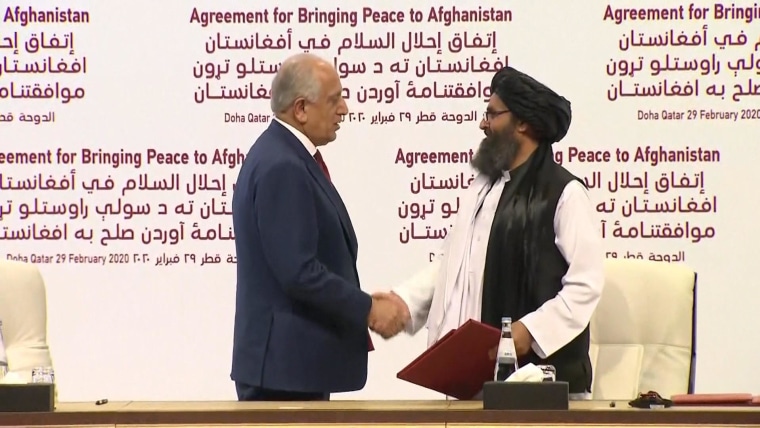Secretary of State Mike Pompeo flew into Kabul on Monday amid an impasse between the Afghan government and the Taliban over a proposed prisoner exchange.
Pompeo made the unannounced trip to Kabul even as senior U.S. officials have dramatically scaled back most international travel due to the coronavirus pandemic.
Pompeo’s visit coincided with efforts by U.S. special representative Zalmay Khalilzad to resolve the dispute over the prisoner swap, which threatens to undermine a fledgling peace process launched in an agreement last month between the Taliban and the United States.
Khalilzad called on both the Afghan government and the Taliban to follow through on prisoner releases to clear the way for direct peace talks between the adversaries, citing the coronavirus outbreak as yet another reason to move quickly. Authorities in Afghanistan put the number of confirmed cases at 34 as of Sunday but due to limited testing and the vulnerabilities in the health care infrastructure, the actual number is feared to be higher.
“Everyone clearly understands the coronavirus threat makes prisoner releases that much more urgent,” Khalilzad said in a tweet, adding that “all sides conveyed their strong commitment to a reduction of violence, intra-Afghan negotiations, and a comprehensive and permanent ceasefire.”
The two sides spoke Sunday via a Skype video conference call brokered by the United States and Qatar, Afghan officials and the Taliban said. Due to travel restrictions that precluded a face-to-face meeting as a result of the coronavirus outbreak, the two sides opted for a virtual meeting.
Let our news meet your inbox. The news and stories that matters, delivered weekday mornings.
“Both sides exchanged options on initial technical steps for the release of prisoners,” the Afghanistan National Security Council said in a statement afterward. The council also said that a reduction in violence, direct peace talks and a permanent cease-fire were also discussed.
A Taliban spokesman, Suhail Shaheen, confirmed the online discussion in a tweet but said the conversation only focused on the exchange of prisoners.
The Afghan government has argued for a phased release of Taliban prisoners based on conditions while the Taliban has insisted on the release of up to 5,000 Taliban members up front as a condition to start direct peace talks.
The proposed prisoner exchange was part of an agreement between the United States and the Taliban signed in Doha last month that called for the withdrawal of American troops in 14 months in return for the Taliban entering into peace talks with their foes in the Afghan government.
Under the deal, the United States promised to seek the release of up to 5,000 Taliban fighters held by the Afghan government, in exchange for about 1,000 Afghan troops held by the insurgency.
The Afghan government was not a signatory to the agreement, however, and officials in Kabul are reluctant to hand over prisoners without more firm guarantees from the Taliban that the insurgency is ready to negotiate a genuine peace and halt its attacks.
Groundbreaking discussions between the Afghan government and the Taliban were scheduled to begin March 10, a deadline that has come and gone with little forward movement.
Meanwhile, violence by the Taliban against the Afghan Defense and Security Forces has continued, with the most recent attack leaving 27 dead, according to the Afghan Defense Ministry.
“This heinous act of the Taliban is a clear example of their commitment for continued violence and against the AFG peace process,” tweeted Sediq Sediqqi, a spokesperson for the Afghan president.
Apart from the dispute over prisoner releases, the Afghan government is plagued by a deep political rift, with two rivals claiming to be the legitimate victors in recent presidential elections. President Ashraf Ghani was declared the winner but the runner-up, Abdullah Abdullah, has alleged the vote was tainted by fraud and held a rival inauguration ceremony the day Ghani was sworn in.
U.S. officials so far have been unable to resolve the disagreement.
Complicating the situation further, President Donald Trump has not yet nominated a permanent replacement for former Ambassador John Bass who departed the Kabul post in January. Instead the U.S. Embassy is temporarily led by former longtime career foreign service officer Ross Wilson, under the title of charge d’affaires.













